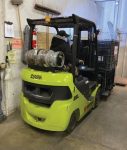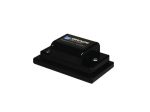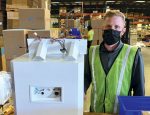A Hiawatha-based assembly and supply chain integration company expects to see at least $5 million a year in new business after CIRAS facilitated a partnership with an air purification company. World Class Industries started work in October under a contract that quickly will see the company producing 24,000 room-sized air purifiers annually for Timilon Acquisitions.
Month: February 2021
Mix of Ancient, Advanced Technologies Salvage Older Elevator
A downtown Des Moines apartment building avoided a costly elevator replacement last year after CIRAS helped its owners recreate an essential piece of safety equipment. Investors bought the aging, 11-story building at 600 East Fifth Street in Des Moines in 2013. They then renamed it The Lyon and spent two years remodeling it into 103 new apartments. A problem soon became apparent, however, in that something important seemed to have been lost during the sale.

UEA Finds Success through Proposal Process
A Waverly manufacturer of slip rings landed a $1.7 million contract from the Federal Aviation Administration after CIRAS helped the company understand government bidding requirements and learn how to write a formal proposal. Hemen Dattani, sales director for United Equipment Accessories (UEA), was tasked last March to explore federal contracting opportunities so UEA could leverage a newly forged research and development partnership to expand design capabilities and make the company competitive in new markets. He turned to the CIRAS Procurement Technical Assistance Center (PTAC) for help.

TG Industries Flips a Switch to Cut Costs, Stabilize Supply
An Armstrong maker of hydraulic lift vehicles expects to save money and eliminate production delays after CIRAS helped the company find an alternative for a problem part. TG Industries, which also does business as Arm Lift, started using a particular type of rocker switch in its vehicles in 2000, said engineer Loren Kinnander. By 2019, the once-standard switches were no longer common. Prices rose as they became harder and harder to obtain from the company’s single overseas supplier.

CIRAS Guides Grinding Improvement at Weiler
A Knoxville-based heavy equipment manufacturer estimates that the company retained more than $10 million in sales after CIRAS helped it solve a problem with cracking shafts on a rock drill used in highway construction. Mark Prachar, a project engineer with Weiler, said the company took control of a new process for making components for its rock drills in 2018—only to find cracks in the shafts produced. Company engineers, many of them Iowa State University graduates, turned to CIRAS for help diagnosing the problem.

CIRAS Helps 43 North Iowa Chart New Course
Despite a global pandemic, two north Iowa service organizations will be ending 2020 on firmer footing thanks to a merger facilitated by CIRAS-arranged coaching and strategic planning. North Iowa Vocational Center Inc., or NIVC Services, formally joined with North Iowa Transition Center, or NITC, at the beginning of this year to become 43 North Iowa—a … Continue reading CIRAS Helps 43 North Iowa Chart New Course

CIRAS Helps Latham Hi-Tech Seeds Have Smooth Spring
An Alexander, Iowa, seed company estimates it will gain more than $3 million in new business over the next year, partly because CIRAS helped the company become more efficient in the face of rapid growth. Chris Latham, chief financial officer for Latham Hi-Tech Seeds, said his company struggled to keep up with its orders for soybeans and seed corn in 2019 as it expanded into new markets in South Dakota. The increased business, along with a growing trend of farmers seeking to accept their seed as close to the beginning of planting season as possible, seemed to be creating bottlenecks.

Collaborating to Predict Machine Failure
A Davenport manufacturer of electrical safety devices is prototyping a new product intended to help equipment operators predict when their machines will fail. The new system, which is expected to be released within the next year, will use special sensors created by Davenport-based Grace Technologies integrated with predictive algorithms using an Internet of Things (IoT) architecture. The technology has grown out of a collaborative, CIRAS-supported research effort between Grace and Iowa State University.
